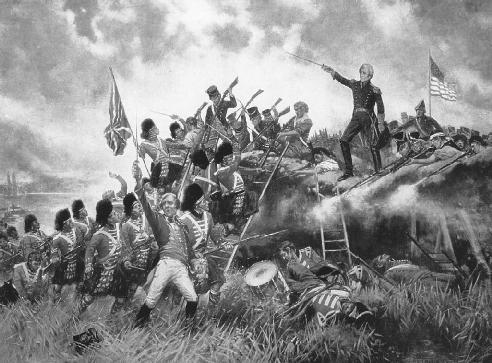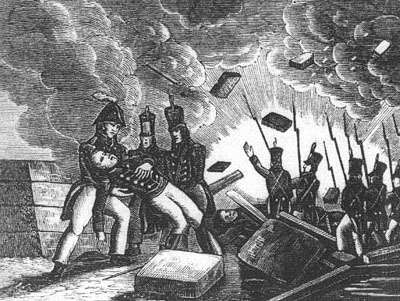The United States of America began to see the effects of the Anglo-French War by the early 1800s. This European quarrel began affecting the United States shipping industry. Britain and France were violating the neutral shipping rights of American merchants. They thought of America as weak due to the inadequate time the nation had to develop.
These violations were the first and primary provoking factors that led to war with Britain. There was a reason that Britain became the target of the US military rather than France.
Britain has influenced Indians around Lake Michigan to resist white settlement. This was one of the primary reasons the English were chosen as our foe. Britain had the Indians do this as an attempt to keep the U.S. border as low as possible – not exceeding the Canadian border. France had made no such attempts to interfere with America; they in fact only had the simple desire to obtain our goods.
They did with hopes of gaining this territory for their new colony later. Consequently, Britain became the target, and it led to a continuation of the American Revolution. The primary cause of the war with Britain was the fact the neutral shipping rights were violated by Britain, and though France had also violated these rights, there were other issues that the British were responsible for.
Britain blockaded the United States in such a manner it was no longer possible to export goods by ship. The British were not doing this to harm America’s economy, however, it was extremely harmful to the economy of this young country. Britain was doing this so that France could not import as many goods that would behoove them in the war.
France desperately needed various goods that could be imported from the United States and they were willing to pay where America’s economy could have benefited tremendously. Though the fact of the matter is Britain’s enormous, notorious navy would not allow the exporting of America’s goods. The desire for Canadian colonies to join the United States, and the accusations of the British supplying Indians with weapons to be used against the U.S. are also causes of the War of 1812.
The battles of this war were primarily fought on US soil. The British military was surprised by the United States military. They had underestimated the young country that was blossoming and flourishing on freedom. The battle of Stoney Creek is an example of a battle in which the British were surprised by not surprising the US. Lieutenant- Colonel John Harvey chose 700 soldiers 8th and 49th regiments. These men arrived at the American camp at 2:00 am June 6, 1813, incidentally King George III’s birthday.
The English forces set their bayonets forward and ran upon the camp while whooping like Indians. Much to their surprise, there were mysteriously only some smoldering campfires and some cooks around them. The British realized what had happened: the order had been made for the American troops to sleep at the higher ground for the night with their arms by their sides. American troops spotted the British while running down upon the camp and had very little time to attempt to scramble into place. Their time wasn’t a lot, but it was much more than the British had.
The surprise element was not only lost, but had backfired on the British. The 49th regiment split left under the command of Major James Ogilivie; the 8th regiment had split right. Neither regiment had adequate time to form a line there before the barrage of fire descending upon them.
At this crucial moment, Major Plenderleath, with about 20 men of the 49th, darted up the hill towards four of the American guns that were mounted on Smith’s knoll (where the lion monument stands now). They had managed to shoot two rounds of this artillery before being seized by the British, but the artillery was to play a vital part in the victory of the battle.
Consequently, American troops suffered much more of a loss than they would have if they had prevented the capture of these pieces. The British casualties were still greater. Britain had lost 214 of their man against the 168 American losses, however, Britain’s attack would have been much more unsuccessful had the Americans been able to keep their brigadiers. Far from all battles were American victories. The battle of Washington D.C. for instance: was a tragedy.
There were many factors that behooved Britain. One of the most outstanding disappointments is the deprival of the 5,000 militiamen that Pennsylvania was to have rounded up, but didn’t due to the law concerning the matter of militia in the state. Records show that no one “got around to it.” What a shame for the historical items lost due to the plundering of the capital. Winder, the nephew of Maryland’s governor, was in charge of defending the capital from the red coats. Winder’s military history was not one of glory nor glamour: he had been captured wandering in the dark in the Battle of Stoney Creek.
He slept very little the last five days before the battle. He had been busy raising a militia to defend Washington D.C. It was impossible for him to know the objective of the nearing red coats: he knew not which entrance upon the capitol they would enter from. That is if they were to attack the capital. Annapolis and Fort Warburton were other possible locations that could be attacked. It was ordered that he was to have 15,000 men, yet when the red coats were only eight miles away he was armed with 3,000.
These men were not even trained because they were not drafted to fight until it was “imminent.” The sharpshooter armed with mostly muskets rather than rifles, the cowardly militia, and the cannons were not an adequate defense for the capitol.
The red coats entered over the bridge, the Baltimore 5th was in place firing upon the British that was heading for the river’s edge. Nearly all British officers were hit, but the battle was far from over for Britain: they pursued the battle. The four men that were to man the two cannons at the white house abandoned their post as did most of the militia. Dolly Madison had her wagon of belongings ready on a minutes’ notice, but when the notice was given she did not leave without Gilbert Stuart’s full-length portrait of George Washington.
The British broke rockets open and used the powder to set buildings ablaze. The President’s Mansion, Capitol, Treasury, public buildings, and private houses were all doused in flames. Nothing was sacred to the angry British; it was somewhat revenge for the burning of Newark and York. Once over and analyzed it is quite apparent how little was gained by either of the opposing forces of the war. The British suffer tremendous casualties. The U.S. gained nothing in terms of land. This war was indeed pointless: it is amazing how one leader’s feelings can kill thousands.
President Madison got involved in this war because he felt that the country’s pride had been stepped on. The opportunity to challenge Britain came up, and Madison jumped into it readily. The War of 1812 was definitely a war this nation could have gone without taking part in. It was ridiculous to lose so many valuable American lives for such worthless reasons – pride. Pride should be swallowed on certain occasions: this was definitely a time in which our leaders of America could easily have swallowed their pride at much less of a cost.
American merchants and greed can be held at fault for this costly American war. Had merchants not pushed so hard this war may have been avoided, but they fact is it did. The War of 1812 did, however, strengthen America’s ability to be self-reliant. This is valuable, but not worth the thousands of lives that were spent obtaining this minor war-time convenience.



The best single resource I have found for homework help (and learning) about the War of 1812!